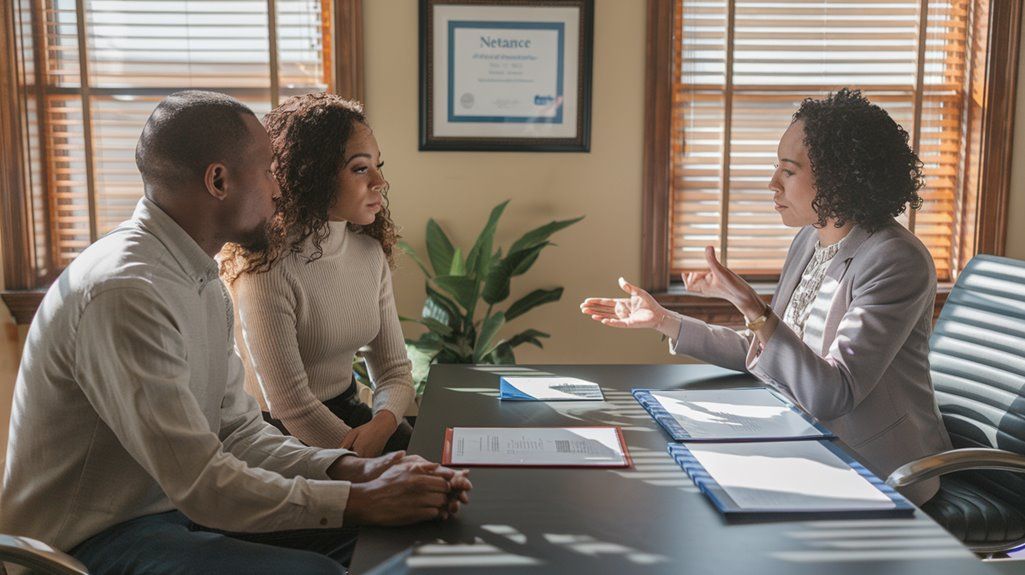Navigating Infidelity: Can Couple's Counseling Rekindle Trust?
Share this article:

Couple's counseling can truly help rekindle trust after infidelity. It offers a safe space for you both to express your feelings and worries openly. Through guided discussions, you'll explore the underlying issues that led to the betrayal, allowing for healing and understanding. You'll learn vital communication skills and techniques to rebuild your emotional connection, fostering empathy between you. Trust restoration takes time, but with commitment to the process, you can emerge stronger. If you're curious about practical steps to navigate this journey, there's more to discover on how to reinforce your bond and move forward together.
Listen to the Article
Key Takeaways
- Couple's counseling creates a safe environment for open dialogue, crucial for rebuilding trust after infidelity.
- Guided discussions in counseling help explore underlying issues that contributed to the betrayal, fostering understanding.
- Effective communication skills taught in counseling, such as active listening and "I" statements, enhance emotional connection and trust.
- Trust-building activities and rituals introduced in counseling reinforce commitment and promote vulnerability between partners.
- Professional support during counseling facilitates the healing process, allowing both partners to navigate emotions and work towards forgiveness.
Understanding Infidelity
Infidelity can shatter the foundation of a relationship, leaving both partners feeling lost and hurt. Understanding the causes of infidelity is crucial for navigating this painful experience.
Often, betrayal stems from unmet emotional needs, a desire for validation, or even a quest for excitement. It's essential to recognize that these motivations aren't excuses; they highlight underlying issues that may have been overlooked.
There are various types of betrayal, ranging from emotional affairs to physical infidelity. Each type carries its own weight and nuances.
Emotional affairs can be particularly insidious, as they involve deep connections that often erode trust without any physical involvement. On the other hand, physical infidelity might feel more straightforward but can still have profound emotional consequences.
As you explore these complexities, remember that understanding infidelity requires a compassionate perspective. It's about more than just the act itself; it's about the feelings, vulnerabilities, and unmet needs that may have contributed to this breach of trust.
The Role of Couple's Counseling
Navigating the aftermath of infidelity can feel overwhelming, and many couples find themselves at a crossroads. Couple's counseling plays a vital role in helping you both understand and address the complexities of your relationship dynamics.
In a safe, supportive environment, a skilled therapist can facilitate meaningful conversations, enabling you to express feelings that may have been previously buried.
Through counseling, you'll learn effective conflict resolution strategies that empower you to tackle difficult conversations head-on. Instead of falling into destructive patterns, you'll start to recognize triggers and learn how to communicate your needs more clearly.
This process not only fosters understanding but also creates a space for healing.
As you work through your emotions, the therapist can guide you in exploring the underlying issues that contributed to the infidelity. By addressing these core concerns, you can begin to reshape your relationship into one founded on transparency and respect.
Trust Restoration Techniques
Restoring trust after infidelity often requires a deliberate and thoughtful approach, and it's essential to be patient with yourself and your partner throughout this journey.
Start by engaging in trust exercises that encourage open dialogue. Vulnerability practices can help you both express feelings and fears, fostering a deeper connection. Establish accountability measures where both partners agree on behaviors that promote trust and transparency strategies to ensure honesty at all levels.
Incorporate empathy building techniques to understand each other's perspectives better. Create relationship rituals that reinforce your bond, whether it's weekly date nights or regular check-ins about feelings.
Conflict resolution becomes crucial; practice resolving disagreements constructively to avoid past patterns. Setting shared goals helps both partners envision a future together, reinforcing commitment to the relationship.
Use positive affirmations daily to remind each other of your dedication and love. Trust rebuilding takes time, but with consistent effort and compassion, you both can emerge stronger.
Emotional Support During Healing
During healing, active listening becomes essential; it shows your partner that you truly value their feelings and experiences.
By nurturing an emotional connection, you both create a safe space for vulnerability and understanding.
This support not only fosters healing but also strengthens your bond moving forward.
Importance of Active Listening
Listening actively is crucial when supporting your partner through the emotional turmoil of infidelity. It's not just about hearing their words; it's about understanding their feelings and validating their experiences.
When you engage in active listening, you create a safe space for your partner to express their pain, anger, or confusion without fear of judgment. This active engagement fosters trust and encourages open dialogue, essential for healing.
Responding with empathetic responses is vital. Rather than jumping to conclusions or offering solutions too quickly, take a moment to reflect on what your partner is sharing.
Acknowledge their feelings by saying things like, "I can see how hurt you are," or "That sounds incredibly difficult." These statements show you're not only listening but genuinely care about their emotional state.
Building Emotional Connection
Healing from infidelity can feel like navigating a stormy sea, where emotions surge and crash unpredictably. To rebuild your emotional connection, you need to prioritize emotional safety and intimacy.
Fostering a space where vulnerability sharing is encouraged will help both of you feel secure. Here are some effective strategies to strengthen your bond:
- Trust Exercises: Engage in activities that promote honesty and openness, allowing you to gradually rebuild trust.
- Connection Activities: Schedule regular moments to connect, whether it's a walk, a shared hobby, or simply enjoying a meal together. These shared experiences can be grounding.
- Relationship Rituals: Establish rituals that signify your commitment to each other, like weekly check-ins or date nights that focus on intimacy building.
- Empathy Building: Practice active empathy by listening to each other's feelings without judgment, which fosters deeper emotional intimacy.
Identifying the Root Cause
How can you truly understand the complexities of infidelity without digging deep into its root causes? Identifying these underlying issues is crucial for healing and rebuilding trust dynamics.
Often, infidelity isn't just a single act; it's a culmination of emotional triggers linked to your relationship history and personal values. Reflect on how past experiences shape your attachment styles and influence your emotional needs.
Consider the communication patterns that may have contributed to intimacy challenges. Are there unspoken expectations or unresolved conflicts that have eroded your connection?
Self-esteem issues can also play a significant role—sometimes, individuals seek validation outside the relationship when their emotional needs aren't met.
Recognizing your partner's coping mechanisms can provide insight into their choices. Understanding their motivations helps you both navigate the pain and confusion surrounding infidelity.
Improving Communication Skills
Effective communication serves as the cornerstone of any healthy relationship, especially after experiencing the turmoil of infidelity. To rebuild trust, you must enhance your communication skills and become attuned to both verbal and nonverbal cues. This means being aware of body language, tone, and facial expressions that can significantly impact dialogues.
Here are four key strategies to improve your communication:
- Active Listening: Focus completely on your partner when they speak. This fosters a sense of safety and encourages openness.
- Express Your Feelings: Use "I" statements to articulate your emotions without blaming. For example, say "I feel hurt when…" instead of "You always…"
- Stay Calm During Conflict: Keep your emotions in check. Take a break if needed, and return to the discussion with a clearer mindset.
- Practice Nonverbal Communication : Be mindful of your body language. A warm smile or open posture can promote a supportive environment.
Reinforcing Commitment Together
Reinforcing commitment together after infidelity requires both partners to actively engage in rebuilding their connection.
Start by establishing commitment rituals that symbolize your renewed dedication to one another. These rituals can be as simple as a weekly date night or a daily check-in, creating a structure that fosters intimacy and trust.
Next, focus on shared goals that align your aspirations and values. Discuss your dreams for the future, whether it's travel, family planning, or personal growth.
By working towards these common objectives, you'll cultivate a sense of teamwork and unity, reinforcing the bond that may have felt fractured.
Don't underestimate the power of vulnerability during this process. Share your fears and desires openly; it's crucial to create a safe space for honest communication.
Celebrate small victories along the way, as each step forward strengthens your commitment.
Setting Healthy Boundaries
As you work on reinforcing your commitment, it's important to set healthy boundaries that protect your relationship and foster trust. Establishing these boundaries can help both of you navigate the complexities of your emotions and individual needs, ensuring a foundation built on mutual respect.
Here are four essential guidelines to consider:
- Define Emotional Boundaries : Clearly express your feelings and limits. Ensure both of you understand what emotional support looks like, and respect these feelings in your interactions.
- Establish Privacy Boundaries : Discuss what personal space means for each of you. Respecting each other's privacy is vital for trust limits, so be open about what feels comfortable.
- Create Conflict Management Rules : Agree on how to approach disagreements. Setting relationship guidelines for addressing conflicts can lead to healthy interactions and prevent further misunderstandings.
- Acknowledge Individual Needs: Recognize that both of you have unique needs. Prioritize individual growth while nurturing your connection, ensuring that each partner feels valued.
Rebuilding Connection After Betrayal
Rebuilding your connection after betrayal can feel overwhelming, but it's crucial to understand the emotional impact on both of you.
Establishing open communication is key; it allows for honest expressions of feelings and fosters healing.
Together, you can create a safe space to rebuild trust and intimacy.
Understanding Emotional Impact
Navigating the emotional aftermath of infidelity can feel overwhelming, leaving both partners grappling with feelings of betrayal and hurt.
You might find it challenging to process your feelings, but building emotional resilience is crucial in this journey. Acknowledging your emotional state and developing effective coping strategies can help you both heal and reconnect.
Here are four key strategies to consider:
- Identify Your Emotions: Take time to name your feelings—anger, sadness, confusion. Understanding what you're experiencing is the first step toward healing.
- Practice Self-Compassion: Be gentle with yourself. It's okay to feel hurt, and allowing yourself to grieve the loss of trust is essential.
- Engage in Open Reflection: Spend time reflecting on what led to the infidelity. This can provide insights into your relationship dynamics and help you both grow.
- Seek Professional Help: Couples counseling can offer a safe space to explore your emotions and develop healthier patterns together.
Establishing Open Communication
After experiencing infidelity, establishing open communication becomes essential for rebuilding trust and connection. You must create a safe space where both partners can share their feelings without fear of judgment.
Start by acknowledging the communication barriers that may have contributed to the betrayal. Recognizing these obstacles allows you to address them head-on, fostering an environment of honesty and vulnerability.
Effective expression is key. Practice active listening —truly hear what your partner is saying without formulating your response while they speak. This demonstrates respect and a genuine desire to understand their perspective.
Encourage your partner to articulate their feelings and thoughts, no matter how difficult. It's crucial that both of you feel validated in this process.
Set aside regular times to check in with each other. These moments can serve as a reset, allowing you to discuss not just the past but also your hopes for the future.
And remember, patience is vital. Rebuilding trust takes time, but by committing to open communication, you're laying the groundwork for a stronger, more resilient relationship.
Embrace this journey together, and let it guide you toward healing and reconnection.
Navigating the Forgiveness Process
In the wake of infidelity, the path to forgiveness can feel daunting and complex. It's essential to approach this journey with intention. You can implement effective forgiveness strategies that not only promote healing but also lay the groundwork for trust rebuilding.
- Acknowledge Your Feelings: Recognizing your emotions is crucial. Allow yourself to feel hurt, anger, or confusion without judgment.
- Communicate Openly: Share your feelings with your partner. Honest dialogue is a vital step in understanding each other's perspectives and rebuilding trust.
- Set Boundaries: Establish clear boundaries moving forward. This helps create a safe space for both partners, reinforcing your commitment to healing.
- Seek Professional Help: Engage in couple's counseling. A trained therapist can guide you through the forgiveness process, ensuring both partners feel heard and supported.
Frequently Asked Questions
How Long Does Couple's Counseling Typically Last After Infidelity?
Couple's counseling after infidelity usually spans several months, depending on your healing timeline and emotional impact. It's crucial to focus on open communication and trust-building during this journey to foster lasting change and understanding.
Is Infidelity Always a Sign of Relationship Failure?
Infidelity isn't always a sign of relationship failure. It often reveals deeper emotional triggers and trust rebuilding challenges. Understanding these dynamics can help you grow, fostering resilience and intimacy in your partnership if both are willing.
Can Infidelity Be Completely Forgiven and Forgotten?
Imagine sailing through stormy seas; infidelity can feel like a shipwreck. Yet, embarking on a forgiveness journey and rebuilding trust can lead to calmer waters, allowing you to heal and possibly forget the past.
What if One Partner Refuses to Attend Counseling?
If one partner won't attend counseling, focus on communication strategies that promote open dialogue. You can still work on building resilience together, fostering understanding, and creating a supportive environment that encourages healing, even without their participation.
Are There Specific Therapists Specialized in Infidelity Issues?
Isn't it comforting to know that specialized therapists focus on infidelity recovery? They understand the complexities involved and can guide you through healing, rebuilding trust, and fostering communication in your relationship. You're not alone in this.
Connect with Us:
Connect with Us:



